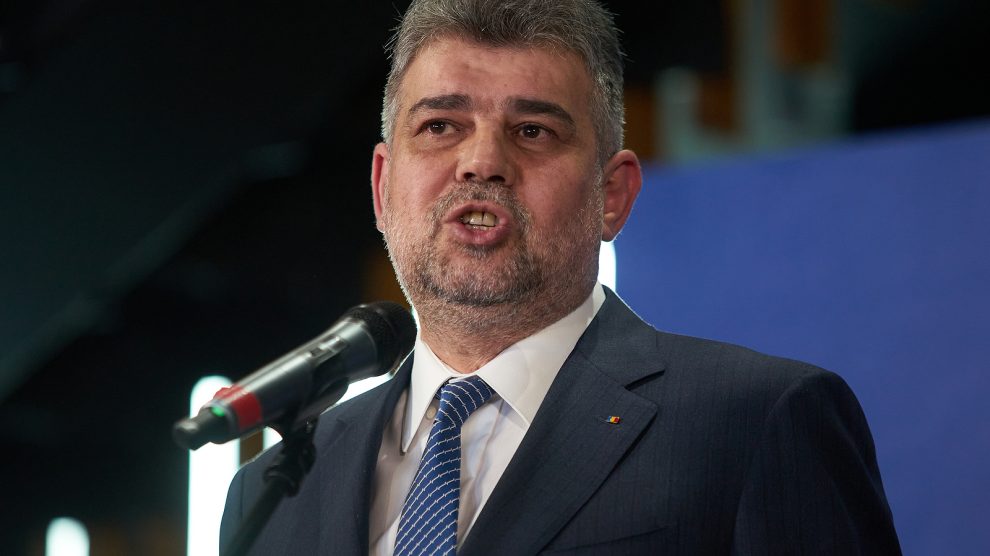Expect little change as Romania names a new prime minister and members of its cabinet play musical chairs.
Romania got a new prime minister on June 13: Marcel Ciolacu (pictured above), leader of the country’s largest party, the Social Democrats (PSD).
There was little drama, or surprise, surrounding the appointment. The PSD and the Liberals (PNL) formed a grand coalition government in late 2021 – together with a junior partner, the UDMR, backed mainly by the country’s ethnic Hungarians – and had long ago agreed that they would rotate premiers.
The PNL’s Nicolae Ciucă resigned as prime minister early in the afternoon of June 12, a couple of weeks later than originally planned owing to a teachers’ strike which ended only hours before.
- Uneven growth forecast for emerging Europe, but the mood is brightening
- Moldovans rally for their EU future
- The last word: Emerging Europe’s impressive journey
“That we are here to rotate prime ministers shows a new level of involvement and seriousness of the ruling coalition,” said Romania’s president, Klaus Iohannis. “Romanians were promised stability and they are getting stability.”
Cătălin Drulă, leader of the Save Romania Union (USR), the country’s largest opposition party, called the government rotation, “not stability but stagnation”.
“Romania needs change, not more of the same,” he said.
‘Economic patriotism’
Approaching the end of his second term in office, Iohannis has on several occasions sworn to never again “trust” the PSD with government. Nevertheless, Ciolacu is the fourth member of the party he has named as prime minister since taking office in 2014.
The change in prime minister is unlikely to bring any real shift to Romania’s economic or foreign policy, although with an eye on both parliamentary and presidential elections due by December 2024, Ciolacu has promised to pursue a policy he has dubbed “economic patriotism”.
“Romania has a chance to move away from an economy based on the consumption of imports to one based on the consumption of locally-produced goods,” said Ciolacu.
“It’s the only way to ensure economic growth, to create more jobs and to stabilise our balance of trade. ‘Buy Romanian’ should be the slogan that guides our actions.”
Ciolacu was careful to add, however – in a pre-emptive move to assuage the fears of foreign investors – that he considers all companies producing in the country, regardless of whether their shareholders are Romanian or foreign, to be “Romanian”.
Musical chairs
Several ministers have kept their jobs, with the only change in the makeup of the government being the withdrawal of the UDMR, unhappy at being overlooked for key cabinet posts. Its votes were not needed to keep the government in office, however. Together, the PSD and PNL hold over 60 per cent of seats in the Senate, the upper house of parliament, and 55 per cent in the lower house.
There are, however, a couple of noteworthy changes. Luminița Odobescu, hitherto an advisor to President Iohannis and a former Romanian representative at the EU, takes over from Bogdan Aurescu as foreign minister. The change is unlikely to dent Romania’s support for Ukraine. Odobescu has visited Kyiv several times since Russia invaded the country in 2022.
Adrian Câciu meanwhile, previously the minister of finance, swaps jobs with Marcel Boloș and will take charge of European Union funding. Improving the country’s capacity to efficiently absorb EU funds will be critical, according to the World Bank. The sizeable funds, and associated structural reforms, could partially mitigate the impact of higher interest rates and uncertainty on private investment and alleviate some of the fiscal pressures resulting from heightened energy and food prices.
Indeed, tackling inflation will be top of the agenda for Ciolacu. Romania’s annual inflation rate eased to 10.64 per cent in May 2023 from 11.23 per cent in April, but Ciolacu has set a target of bringing it down to under eight per cent by the end of the year. He has also, however, promised that the country’s average net salary will increase to 1,000 euros by the end of 2024, and that the minimum net salary will be above 500 euros.
The average net salary in March was just over 800 euros.

Slowing growth
Romania’s economy performed better than expected in 2022, expanding by 4.8 per cent. Growth was driven by strong private consumption (up 5.5 per cent year-over-year) benefiting from the phasing-out of Covid-19 pandemic restrictions, higher wages, and muted unemployment.
However, consumer spending gradually weakened in the second half of the year as higher prices squeezed disposable income.
In its latest Spring Forecast, the Vienna Institute of International Economic Studies (wiiw) forecast growth slowing considerably in 2023, to three per cent. This would still, however, be the highest growth among all 11 countries in emerging Europe which are EU members.
The outlook hinges on several factors, including the extent to which spillovers from the war in Ukraine impact the European economy in which Romania is highly integrated; persistent core inflation, and additional volatility in energy and food prices. Central heating prices rose almost 40 per cent in 2022, food by more than 22 per cent.
Unlike many news and information platforms, Emerging Europe is free to read, and always will be. There is no paywall here. We are independent, not affiliated with nor representing any political party or business organisation. We want the very best for emerging Europe, nothing more, nothing less. Your support will help us continue to spread the word about this amazing region.
You can contribute here. Thank you.







Add Comment